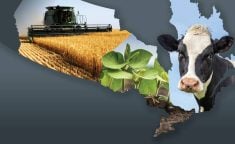Producer groups across Canada are expressing disappointment with the Supreme Court of Canada’s decision to uphold a price on carbon as constitutional.
In a March 25, 6-3 split, the court said that reducing greenhouse gas emissions is “a matter of national concern.”
Ontario, Alberta and Saskatchewan had challenged the Greenhouse Gas Pollution Pricing Act, saying it interfered with provincial jurisdiction.
The Agricultural Producers Association of Saskatchewan, which had sided with the province as an intervener, was disappointed with the decision.
Read Also

Mazergroup’s Bob Mazer dies
Mazergroup’s Bob Mazer, who helped grow his family’s company into a string of farm equipment dealerships and the main dealer for New Holland machinery in Saskatchewan and Manitoba, died July 6 from cancer.
“APAS has estimated the cost of producing an acre of wheat will increase by $12.50 by the time the carbon tax is fully implemented in 2030,” said president Todd Lewis in a news release. “These cost increases will include trucking, rail freight and grain drying.”
He said Ottawa now has to address producers’ needs because of the impacts of its policy.
The Western Canadian Wheat Growers said the plan to reduce greenhouse gases through taxation is “ill conceived.”
“With the ongoing increases in the carbon tax moving to $170/tonne by 2030, I am concerned that many family farms will be taxed so high that the next generation will leave the industry,” said president Gunter Jochum.
The National Farmers Union applauded the decision.
“The NFU became an intervener in the Supreme Court case, not because our organization endorses the federal government’s current greenhouse gas pricing measures, but because the NFU strongly supports the federal government’s constitutional authority to create national policies to reduce emissions,” said president Katie Ward in a statement.
“This decision clears the way for strong federal leadership and enforcement powers coupled with ongoing federal, provincial, and territorial work rooted in the principles and traditions of co-operative federalism.”
Alberta Premier Jason Kenney contended the Supreme Court’s ruling eroded provincial powers. His Saskatchewan counterpart, Scott Moe, said the court’s decision won’t stop his opposition to a “costly and ineffective tax.”
If provinces don’t develop a climate strategy of their own that meets the minimum federal standard, they will continue to abide by Ottawa’s carbon pricing legislation.
Moe’s government is hinting it will develop a model similar to the climate strategy employed by New Brunswick. The levy applied in that province is applied to gasoline and diesel fuels used in transportation. All other fuels and sectors are exempt, including fossil fuels used for agriculture activities.
Alberta has not yet hinted at what its next steps will be.
Running parallel to the efforts to strike down the law are continued labours to change the policy.
To that end, the federal system could soon be offering further exemptions to agricultural producers.
Conservative MP Philip Lawrence introduced a private member’s bill in February 2020 that would extend the exemption for qualifying farming fuel to marketable natural gas and propane, meaning producers would see costs for grain drying and other work become exempt from carbon pricing.
Opposition parties and grower groups have been lobbying Minister of Agriculture and Agri-Food Marie-Claude Bibeau to offer a more favourable exemption since 2019, but the Liberals have not done so.
An evaluation of grain-drying costs provided by some provincial governments or producer groups was done in 2019 by Agriculture Canada. The results don’t represent the department’s estimates, and instead represent a standard set of results from different groups to offer comparable results.
That report found, “based on the information received, the average per-farm cost of pollution pricing associated with grain drying by province ranges from 0.05 per cent to 0.38 per cent of net operating costs for an average farm, equivalent to $210 to $774, depending on the province in question.”
Prior to Lawrence’s law being introduced in the House of Commons, Bibeau pledged to address the situation through legislation introduced by the government.




















